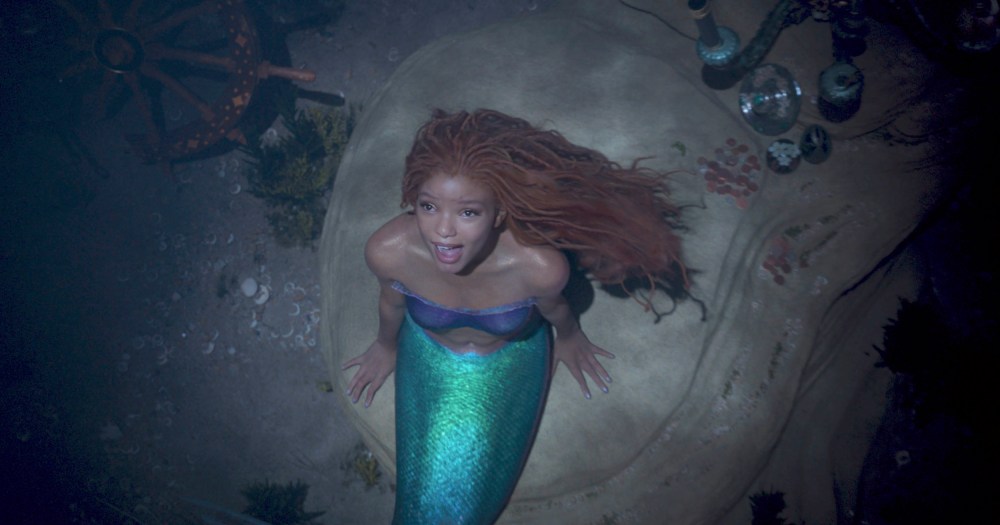When I was growing up in the 1990s, the Black girls in my neighborhood had VHS watch parties featuring “The Little Mermaid.” We persuaded our parents to buy us “Little Mermaid’ comforter sets and light-up sneakers, and we obsessed over Ariel. We wanted to be her, even though with her white skin and straight hair she didn’t resemble us at all.
Today’s Black girls are about to see something we could never have imagined even as we clung to our fairy tales: a Black Ariel, and she even has locs … like me.
Today’s Black girls are about to see something we could never have imagined even as we clung to our fairy tales: Disney’s live-action remake of “The Little Mermaid” is hitting theaters this weekend and, for the first time, we will see a Black Ariel, played by Halle Bailey — and she even has locs … like me.
That’s not the only reason for the overwhelming excitement. This “Little Mermaid” promises to send a better message to girls. “The Little Mermaid” that my friends and I obsessed over isn’t an empowering tale. Ariel, a mermaid, lives deep in the ocean with her overprotective father, King Triton, and an array of sea friends. After she encounters the human, Eric, she trades her beautiful singing voice and mermaid tail for a pair of legs so she can pursue a relationship with him. Her arrangement with the sea witch, Ursula, offers Ariel new beginnings, but she’s also forced to sacrifice all the things that make her who she is for the possible love of a man.
But in this update of the Hans Christian Andersen fairy tale, Ariel not only looks different, but she also behaves different. She’s seeking to better understand herself, not just pining for romantic love. “I’m really excited for my version of the film because we’ve definitely changed that perspective of just her wanting to leave the ocean for a boy,” Bailey told Edition. “It’s way bigger than that. It’s about herself, her purpose, her freedom, her life and what she wants.”
Given the updated message in the film, it’s important that Bailey was able to keep her locs, again not sacrificing who she is to play the role: “It was super important for me to have my natural hair in this film. I was really grateful to (director) Rob Marshall, because he wanted to keep my locs,” she told Ebony. “It’s always important to have somebody to cosign. I’ve had my locs since I was 5, so they’re a huge part of who I am. We need to be able to see ourselves, we need to be able to see our hair on big screens like this, so that we know that it’s beautiful and more than acceptable.”
Given the updated message in the film, it’s important that Bailey was able to keep her locs, again not sacrificing who she is to play the role.
Bailey is right about her “The Little Mermaid” being bigger than a story about a romantic pursuit. It’s bigger than its origin tale. In fact, it’s even bigger than just another Disney remake. This movie is a cultural moment, and the hype surrounding it is similar to that surrounding 2018’s “Black Panther.” In my childless household, we’re so excited that my fiance has asked to take my “inner child” on a date to see the film, complete with stopping at the Disney store to pick up an Ariel doll and grabbing some ice cream. In households with children, the anticipation is through the roof.
When Disney released the trailer for the film in September, Black parents flocked to TikTok and uploaded video after video of their children responding to the moment at the end of the trailer when our new Ariel, Black with red locs down her back, is revealed. Children of all genders gasp, full of joyous disbelief, that this Ariel looks like them. Anaya, whose parents, Glen and Yvette, run the Instagram channel Beleaf in Fatherhood, is so thrilled that she immediately asks when she can watch the movie. Anaya, alongside so many other Black children, got to attend the world premiere. When she spots Bailey on the red carpet, she simply says, “I’m in heaven.”

While there was some skepticism online about the authenticity of the children’s responses, those videos moved so many other Black women, including Bailey, who compiled many of them on her Instagram account.
“When I saw those (videos) for the first time, I just cried,” Bailey told Glamour. “When I watch the babies react and they’re proud of me, it almost heals something within me and my spirit. I get really emotional when I think about it and when I see the reactions. It’s just lovely.”
Representation, particularly in pop culture, is not everything. It is sometimes shallow and oftentimes facile, lacking true nuance and consideration of cultural differences. However, when you are a child and have been deprived of imagery that shines a light on possibilities available to you, representation is … something. It’s why organizations such as Win with Black Women are encouraging Black women entrepreneurs to buy out at least 100 theaters this weekend across the country to support the film.











